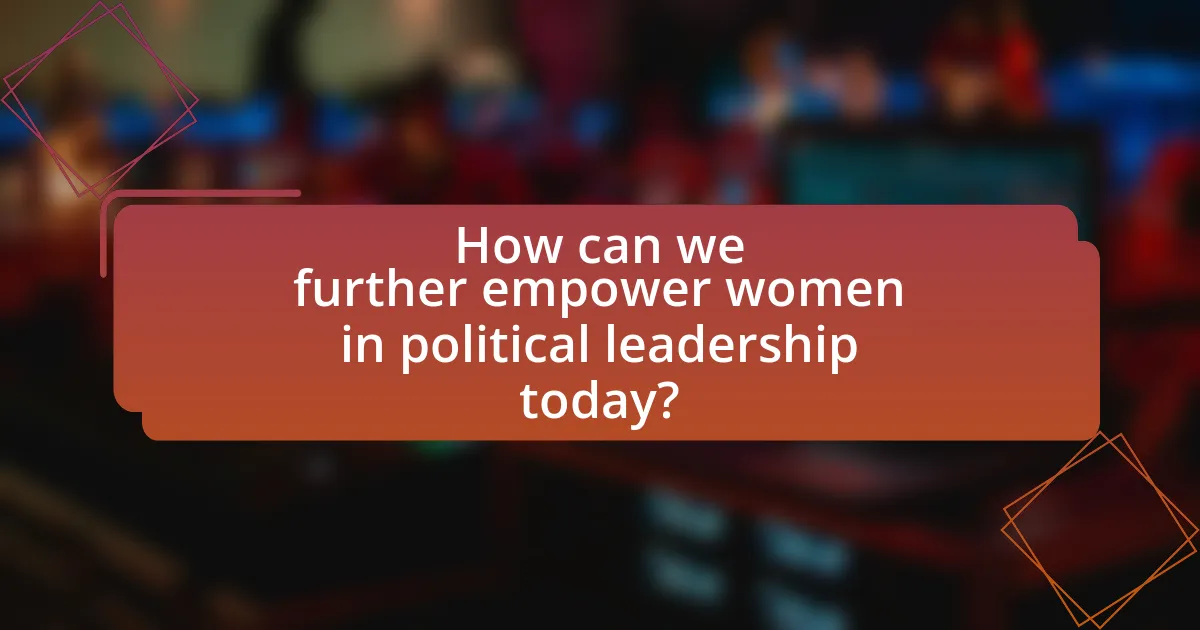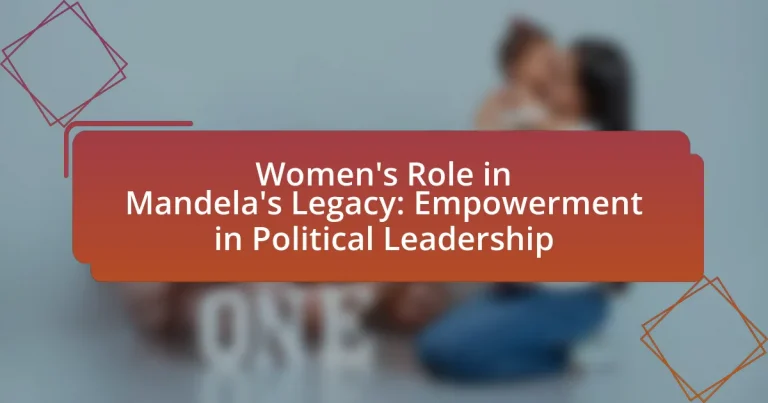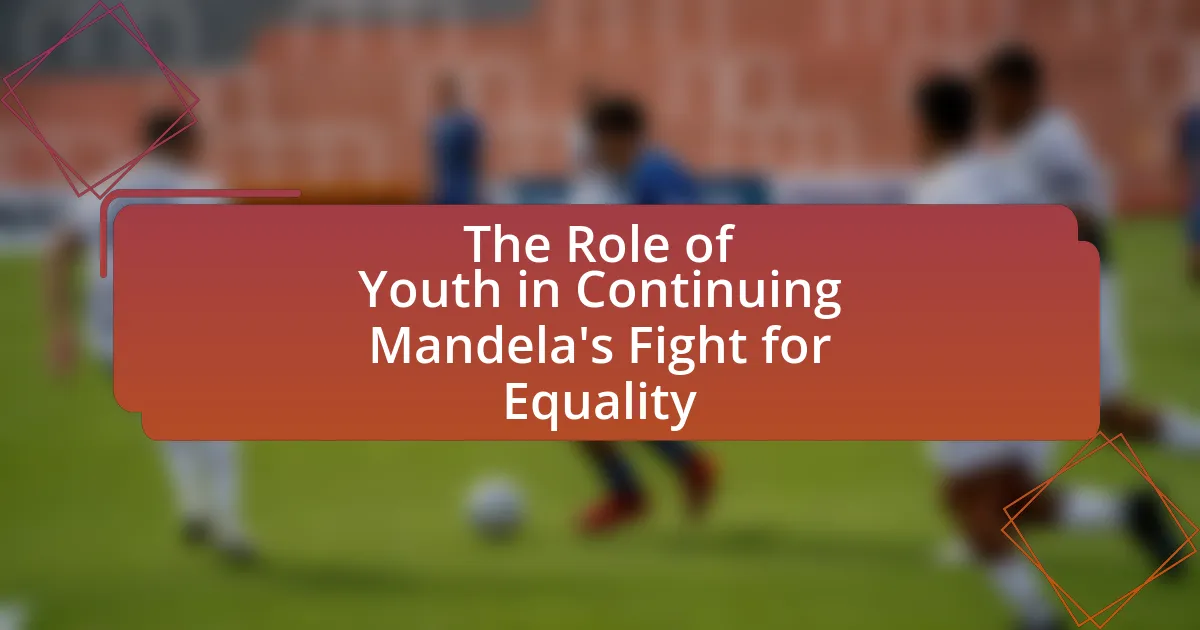The article examines the significant role of women in Nelson Mandela’s legacy, particularly in the context of empowerment and political leadership in post-apartheid South Africa. It highlights the contributions of key figures such as Winnie Mandela and Albertina Sisulu in the anti-apartheid struggle and their influence on gender equality and women’s rights. The article discusses Mandela’s advocacy for women’s empowerment, the establishment of policies promoting gender equality, and the historical challenges women have faced in South Africa’s political landscape. Additionally, it explores initiatives aimed at increasing women’s representation in politics and the impact of education and mentorship on aspiring female leaders, emphasizing the importance of collaboration between genders for effective governance.
What is the significance of women’s role in Mandela’s legacy?
The significance of women’s role in Mandela’s legacy is profound, as they were instrumental in the anti-apartheid struggle and in shaping post-apartheid South Africa. Women like Winnie Mandela and Albertina Sisulu played crucial roles in mobilizing communities, advocating for human rights, and challenging oppressive systems. Their contributions not only highlighted the importance of gender equality in the fight for freedom but also laid the groundwork for women’s empowerment in political leadership within the new democratic framework established by Mandela. This legacy is evidenced by the increased representation of women in South African politics following the end of apartheid, reflecting Mandela’s commitment to inclusivity and equality.
How did Nelson Mandela’s views on gender equality influence women’s empowerment?
Nelson Mandela’s views on gender equality significantly influenced women’s empowerment by advocating for equal rights and opportunities for women within the broader struggle against apartheid. Mandela recognized that the fight for freedom in South Africa was intrinsically linked to the fight for gender equality, stating that “freedom cannot be achieved unless the women have been emancipated from all forms of oppression.” His leadership in the African National Congress included promoting women’s participation in political processes, which led to increased representation of women in leadership roles post-apartheid. This commitment is evidenced by the establishment of the Women’s League of the ANC and the inclusion of gender equality in the South African Constitution, which guarantees equal rights for all citizens. Mandela’s legacy continues to inspire movements for women’s rights globally, reinforcing the idea that gender equality is essential for true democracy and social justice.
What specific actions did Mandela take to promote women’s rights?
Nelson Mandela took several specific actions to promote women’s rights, including advocating for gender equality in the new South African Constitution. He ensured that the Constitution, adopted in 1996, included provisions that explicitly protected women’s rights and promoted equality. Mandela also established the Office on the Status of Women in 1997 to address issues affecting women and to implement policies aimed at empowering them. Furthermore, he actively supported women’s participation in politics, encouraging women to take on leadership roles within the African National Congress and other political structures. These actions were part of his broader commitment to social justice and equality, reflecting his belief that women’s rights are human rights.
How did Mandela’s leadership style impact women’s participation in politics?
Mandela’s leadership style significantly enhanced women’s participation in politics by promoting inclusivity and gender equality. His commitment to social justice and human rights led to the establishment of policies that encouraged women’s involvement in political processes. For instance, during his presidency from 1994 to 1999, Mandela appointed women to key positions in government, such as the appointment of Nkosazana Dlamini-Zuma as Minister of Health, which set a precedent for female leadership. Additionally, Mandela’s advocacy for the Women’s League of the African National Congress (ANC) helped to elevate women’s voices within the party and the broader political landscape, resulting in increased representation and empowerment of women in South Africa’s post-apartheid governance.
Why is women’s empowerment crucial in the context of Mandela’s legacy?
Women’s empowerment is crucial in the context of Mandela’s legacy because it aligns with his vision of equality and justice for all. Nelson Mandela championed human rights and fought against systemic oppression, emphasizing that true freedom includes the empowerment of marginalized groups, particularly women. His advocacy for gender equality is evident in his support for the Women’s League of the African National Congress and his acknowledgment of women’s roles in the anti-apartheid struggle. By empowering women, Mandela’s legacy promotes a more inclusive society, which is essential for sustainable development and social justice.
What historical challenges have women faced in South Africa’s political landscape?
Women in South Africa’s political landscape have historically faced significant challenges, including systemic gender discrimination, limited access to political power, and socio-economic barriers. During apartheid, women were largely excluded from political participation, as the regime prioritized race over gender, leading to the marginalization of women’s voices in decision-making processes. The 1994 democratic transition marked a turning point, yet women still encountered obstacles such as patriarchal norms and a lack of support for female candidates within political parties. According to the 2019 Gender and Elections report by the Electoral Commission of South Africa, women constituted only 46% of the candidates in the national elections, highlighting ongoing disparities in representation. These challenges have persisted despite efforts to promote gender equality, demonstrating the complex interplay of historical and contemporary factors affecting women’s political empowerment in South Africa.
How does women’s empowerment contribute to societal change?
Women’s empowerment significantly contributes to societal change by promoting gender equality, enhancing economic development, and fostering inclusive governance. When women are empowered, they participate more actively in decision-making processes, which leads to policies that reflect diverse perspectives and needs. For instance, research from McKinsey Global Institute indicates that closing gender gaps in labor force participation could add $28 trillion to global GDP by 2025. Furthermore, empowered women often invest in their families and communities, leading to improved health and education outcomes. This ripple effect not only uplifts individual lives but also strengthens societal structures, demonstrating that women’s empowerment is crucial for sustainable societal transformation.
What are the key examples of women’s leadership inspired by Mandela?
Key examples of women’s leadership inspired by Mandela include the activism of Winnie Mandela, who played a significant role in the anti-apartheid movement, and the leadership of Phumzile Mlambo-Ngcuka, who served as the Deputy President of South Africa and later as the Executive Director of UN Women. Winnie Mandela’s resilience and commitment to justice exemplified the spirit of resistance that Mandela championed, while Phumzile Mlambo-Ngcuka’s work in promoting gender equality and women’s rights reflects Mandela’s vision for inclusive leadership. Both women have demonstrated how Mandela’s legacy continues to inspire female leaders in their pursuit of social justice and equality.
Who are notable women leaders influenced by Mandela’s legacy?
Notable women leaders influenced by Mandela’s legacy include Ellen Johnson Sirleaf, the first female president of Liberia, and Graça Machel, a prominent activist and former first lady of South Africa and Mozambique. Ellen Johnson Sirleaf has often cited Mandela’s commitment to democracy and reconciliation as a guiding principle in her leadership, particularly during Liberia’s post-conflict recovery. Graça Machel, who worked alongside Mandela in various humanitarian efforts, has been a strong advocate for children’s rights and women’s empowerment, embodying the values of justice and equality that Mandela championed. Their leadership reflects the transformative impact of Mandela’s legacy on women’s roles in political leadership across Africa.
What roles have these women played in shaping South Africa’s political environment?
Women have played crucial roles in shaping South Africa’s political environment by advocating for equality, participating in resistance movements, and holding leadership positions. Figures such as Winnie Mandela and Albertina Sisulu were instrumental in the anti-apartheid struggle, mobilizing communities and influencing policy changes. Their activism not only challenged oppressive systems but also paved the way for women’s representation in politics, exemplified by the significant presence of women in the post-apartheid government, where women like Nkosazana Dlamini-Zuma have held key ministerial roles. This involvement has led to the establishment of gender-sensitive policies and initiatives aimed at empowering women across various sectors in South Africa.
How have their contributions been recognized nationally and internationally?
The contributions of women in Mandela’s legacy have been recognized nationally through various awards and honors, such as the South African government’s acknowledgment of female leaders in political roles. Internationally, organizations like the United Nations have highlighted their impact on gender equality and political empowerment, showcasing their efforts in global forums. For instance, the recognition of women like Winnie Madikizela-Mandela and their roles in the anti-apartheid movement has been celebrated in international human rights discussions, emphasizing their influence on both national policies and global movements for women’s rights.
What initiatives have been established to support women’s political leadership?
Various initiatives have been established to support women’s political leadership, including the African Union’s Gender, Women and Youth Directorate, which promotes women’s participation in governance across member states. Additionally, organizations like UN Women implement programs aimed at increasing women’s representation in political offices, such as the “Women in Politics” initiative, which provides training and resources for female candidates. Evidence of these initiatives’ effectiveness can be seen in the increase of women in leadership roles in several African countries, where targeted programs have led to a rise in female parliamentarians from 17% in 2015 to over 25% in 2021.
How do these initiatives align with Mandela’s vision for equality?
These initiatives align with Mandela’s vision for equality by promoting gender equity and empowering women in political leadership roles. Mandela believed in the fundamental principle that equality is essential for a just society, as evidenced by his advocacy for human rights and social justice throughout his life. Initiatives that support women’s leadership directly reflect this vision by dismantling barriers to participation and ensuring that women’s voices are heard in decision-making processes. For instance, Mandela’s establishment of the Nelson Mandela Foundation emphasizes the importance of inclusivity and equality, which is echoed in programs aimed at increasing women’s representation in politics. This alignment is further supported by the fact that countries with higher female political representation tend to have more equitable policies, reinforcing Mandela’s belief that true equality can only be achieved through the active involvement of all genders in governance.
What impact have these initiatives had on women’s representation in politics?
The initiatives aimed at empowering women in political leadership have significantly increased women’s representation in politics. For instance, in South Africa, the implementation of gender quotas has led to women holding 46% of seats in the National Assembly as of 2021, a notable increase from 27% in 1994. This shift is attributed to policies promoting gender equality and the legacy of leaders like Nelson Mandela, who advocated for women’s rights. Furthermore, studies indicate that countries with gender quotas tend to have higher percentages of women in political positions, reinforcing the effectiveness of these initiatives in enhancing women’s representation.

How can we further empower women in political leadership today?
To further empower women in political leadership today, implementing gender quotas in political parties and legislative bodies is essential. Research shows that countries with gender quotas have seen a significant increase in women’s representation; for instance, Rwanda has the highest percentage of women in parliament globally, at 61%, due to such policies. Additionally, providing mentorship programs and leadership training specifically for women can enhance their skills and confidence, as evidenced by initiatives like the UN Women’s “Women in Politics” program, which has successfully increased women’s political participation in various countries.
What strategies can be implemented to enhance women’s political participation?
To enhance women’s political participation, implementing quotas for female representation in political bodies is essential. Research shows that countries with gender quotas, such as Rwanda, have achieved over 60% female representation in parliament, significantly increasing women’s influence in decision-making processes. Additionally, providing training programs focused on leadership skills and political campaigning can empower women to run for office. For instance, organizations like the International Institute for Democracy and Electoral Assistance have documented that targeted training initiatives lead to higher candidacy rates among women. Furthermore, fostering supportive networks and mentorship programs can help women navigate the political landscape, as evidenced by studies indicating that mentorship increases women’s confidence and success in political roles.
How can mentorship programs support aspiring women leaders?
Mentorship programs can support aspiring women leaders by providing guidance, networking opportunities, and skill development tailored to their unique challenges. These programs connect women with experienced mentors who can share insights on navigating political landscapes, enhancing leadership skills, and overcoming gender-specific barriers. Research indicates that women with mentors are more likely to advance in their careers; for instance, a study by the American Psychological Association found that mentorship significantly increases women’s confidence and career satisfaction. By fostering these relationships, mentorship programs empower women to take on leadership roles and contribute to political discourse, aligning with Mandela’s legacy of promoting equality and empowerment.
What role does education play in empowering women politically?
Education plays a crucial role in empowering women politically by equipping them with the knowledge and skills necessary to engage in political processes. Educated women are more likely to participate in elections, advocate for their rights, and hold leadership positions. For instance, a study by the United Nations Educational, Scientific and Cultural Organization (UNESCO) found that each additional year of schooling can increase a woman’s likelihood of participating in political activities by 10%. Furthermore, education fosters critical thinking and awareness of social issues, enabling women to challenge gender norms and advocate for policy changes that benefit their communities. This empowerment through education is essential for achieving gender equality in political representation and decision-making.
What best practices can be adopted to sustain women’s empowerment in politics?
To sustain women’s empowerment in politics, implementing gender quotas is essential. Gender quotas ensure that a specific percentage of political positions are reserved for women, which has been shown to increase female representation significantly. For instance, countries like Rwanda have adopted such measures, resulting in women holding over 60% of parliamentary seats, the highest in the world. Additionally, providing training and mentorship programs for women aspiring to political roles can enhance their skills and confidence, further promoting their participation. Research indicates that mentorship increases the likelihood of women entering politics, as seen in initiatives like the Women in Public Service Project, which aims to empower women leaders globally.
How can collaboration between genders improve political outcomes?
Collaboration between genders can improve political outcomes by fostering diverse perspectives that lead to more comprehensive policy-making. Research indicates that gender-diverse teams are more effective in problem-solving and decision-making, as they bring varied experiences and viewpoints that enhance creativity and innovation. For instance, a study published in the Harvard Business Review found that companies with higher gender diversity in leadership positions experienced better financial performance and improved organizational outcomes. This correlation suggests that similar dynamics can be observed in political settings, where inclusive collaboration can result in policies that better address the needs of the entire population, ultimately leading to more equitable and effective governance.
What lessons can be learned from successful women leaders in South Africa?
Successful women leaders in South Africa demonstrate the importance of resilience, strategic networking, and advocacy for social justice. These leaders, such as Nkosazana Dlamini-Zuma and Phumzile Mlambo-Ngcuka, have shown that overcoming systemic barriers requires persistence and the ability to build alliances across various sectors. Their experiences highlight the necessity of leveraging platforms to address issues like gender inequality and economic empowerment, as evidenced by Dlamini-Zuma’s role in the African Union, where she championed women’s rights across the continent. Furthermore, the success of these leaders illustrates that effective communication and public engagement are crucial for mobilizing support and driving change, as seen in Mlambo-Ngcuka’s initiatives at the United Nations.



